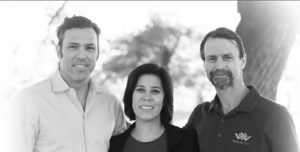By: Robert Avsec, Executive Fire Officer
Last April I wrote a piece after attending my first meeting as a member of the Honorary Board of Advisers (HBOA) for Warriors Heart (WH) just outside of Bandera, Texas (roughly 50 miles northwest of San Antonio). Several weeks ago, I participated in my second such meeting, only now it was as a member of the HBOA for Warriors Heart Foundation.
What’s the Difference?

WH Founders (L-R) Josh Lannon, Lisa Lannon, and Tom Spooner
Since my first meeting, the founders—and driving force—of WH, Josh and Lisa Lannon and Tom Spooner had taken one of our recommendations from that first meeting and “split” the original WH into two separate, but equally important, entities:
Warriors Heart is the for-profit residential treatment facility that provides “cutting edge” treatment for military personnel (active, retired, and disabled), law enforcement officers, firefighters, and EMS personnel (hereafter referred to as clients) to help them overcome their addiction to drugs or alcohol and the effects of post-traumatic stress. As I write this, WH is still the only facility of its type in the U.S.
Warriors Heart Foundation (WHF) is the newer of the two entities. WHF is a registered with the IRS as a 501(3)(c) non-profit organization and its primary function is to raise funds in support of WH so that no future client is turned away due to inability to pay for their treatment. In addition, WHF supports:
- Providing service dogs to clients
- Education and Community Events to raise awareness for WH and the clients it serves
- Law Enforcement & Fire Department PTSD Training
- Building a service dog training facility
- Long-term sober living (An on-site facility where clients who’ve completed their initial program and continue their after-care as they reintegrate into the community)
- Promoting behavioral health education in the military and public safety agencies
- Providing resources for veterans and members of public safety organizations
I strongly urge you to check out the links for both WH and WHF as the folks there have done a far better job of explaining the what, why, and how behind both programs.
What I Can Tell You
The two days I spent on-site this time reinforced many of my thoughts from my original visit. First and foremost, it’s really hard to tell the difference between clients and staff as you move about the grounds. If it weren’t for the lanyards holding their staff credentials, it would be impossible to differentiate between the two.
Before I continue, let me give you a “lay of the land” regarding the program. When a client first arrives at Warriors Heart they go through medically-supervised detox to help them “get clean” if they are abusing drugs and/or alcohol. (It’s a sad fact that military and public safety personnel turn to drugs and/or alcohol to deal with the effects of post-traumatic stress. So, the staff at WH help the clients with one problem before attempting to move on to the second).
Once they complete detox, the client becomes a member of a group of other clients; their new teammates are typically at various stages in their own treatment and this adds to the new support group for the new client. (Another sad fact is that people who come to WH as a client have “lost” their connection with their “old team”, e.g., their military unit, LE partners, fire company, or EMS partners when the effects of post-traumatic stress began to isolate them. Another reason why so many turn to drugs or alcohol as replacements for human connection).
The purpose of the group is to give the client the camaraderie and support and structure that they used to have daily. Each group starts their highly structured day with group activities and assigned chores, e.g., cleaning up the dining room after breakfast, lunch, and dinner have been completed (which includes busing the tables for all the other clients and staff (and visitors like me!).
That last part is just as important as any activity or counseling the clients received while at WH: It helps them to rebuild that sense of “service before self” that was so much a part of their pre-addiction or pre-traumatic stress life.
During the day, each member of the group “goes their separate way” to attend group counseling sessions with other clients who are at the same stage as they are, that is, “newbies with newbies”, “mid-termers with mid-termers”, and so on. What makes these group therapy sessions unique is that every client comes from a similar background: they come from military and/or public safety backgrounds.
The experience of the folks at WH is that this is the key to their success in helping clients to heal and regain  control of their lives. “If you have a S.W.A.T. commander sitting in a group therapy session with a civilian meth addict, that police office is not going to be open and honest with their feelings in that group,” said Spooner, himself a post-traumatic stress disorder (PTSD) and traumatic brain injury (TBI) suffer/survivor. “Those two people are on opposite sides of the coin.”
control of their lives. “If you have a S.W.A.T. commander sitting in a group therapy session with a civilian meth addict, that police office is not going to be open and honest with their feelings in that group,” said Spooner, himself a post-traumatic stress disorder (PTSD) and traumatic brain injury (TBI) suffer/survivor. “Those two people are on opposite sides of the coin.”
There are also one-on-one sessions with individual counselors where the client and their counselor review their treatment plan, their goals, their progress—a review of their “Incident Action Plan”. Another familiar source of structure for military and public safety folks who “grew up” having a mission, mission goals, and measurable performance objectives.
See the common thread here? As one of several clients I spoke with at length during my latest visit to WH said, “This place gave me back the structure and sense of purpose that I’d lost. This place and the people here saved my life.”
 Fire & EMS Leader Pro The job of old firefighters is to teach young firefighters how to become old firefighters!
Fire & EMS Leader Pro The job of old firefighters is to teach young firefighters how to become old firefighters!